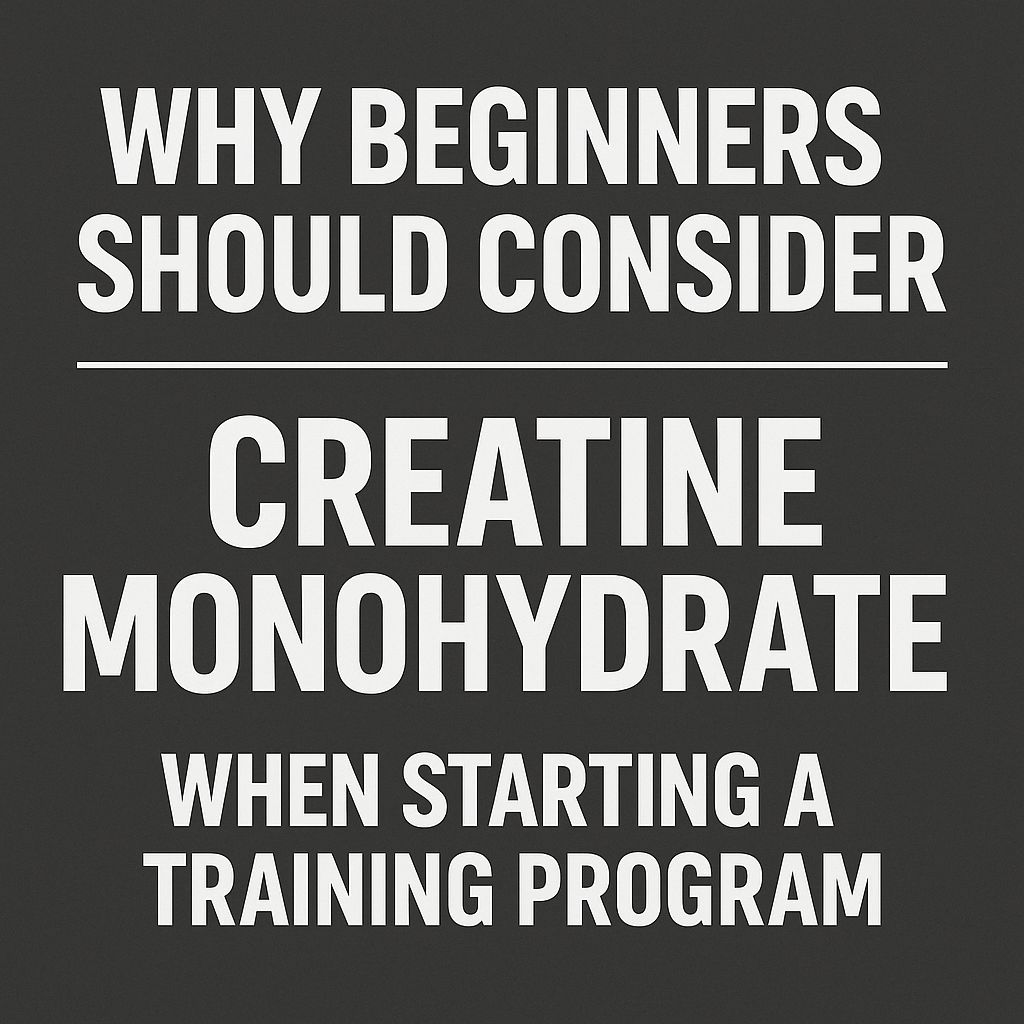
Why Beginners Should Consider Creatine Monohydrate When Starting a Training Program
Share
Why Beginners Should Consider Creatine Monohydrate When Starting a Training Program
When you’re getting back into fitness—or stepping into the gym for the first time—there are countless supplements vying for your attention. Most of them are overhyped, under-researched, or simply unnecessary. But one supplement consistently stands above the rest for both beginners and experienced lifters: creatine monohydrate.
This isn’t just “bro science.” Creatine is one of the most researched, effective, and affordable supplements in the world. If you’re serious about building strength, muscle, and performance, it deserves a place in your routine.
What Is Creatine Monohydrate?
Creatine is a naturally occurring compound stored in your muscles and used for short bursts of high-intensity activity—like sprinting, lifting, or explosive movements. Your body produces some creatine on its own, and you also get it from foods like red meat and fish. But supplementing with creatine monohydrate saturates your muscles with more available energy, allowing you to train harder and recover faster .
Benefits of Creatine for Beginners and Returning Lifters
1. Improved Strength and Power
Creatine increases your ability to produce ATP (the body’s energy currency) during intense exercise. More ATP = more reps, heavier lifts, and better workout performance .
2. Faster Muscle Growth
Studies consistently show creatine supplementation leads to greater gains in lean muscle mass, especially when paired with resistance training . Beginners often see rapid results in the first 8–12 weeks.
3. Enhanced Recovery
Creatine reduces muscle cell damage and inflammation, helping you recover faster between workouts . This is especially important when you’re just starting out and soreness tends to hit the hardest.
4. Better Sprint and High-Intensity Performance
If your training includes conditioning or sports, creatine improves sprint performance, agility, and repeated high-intensity efforts .
5. Cognitive Benefits
Emerging research suggests creatine may also support brain health, improving memory, cognitive processing, and reducing fatigue in demanding tasks .
What About Water Retention?
One of the most common misconceptions about creatine is that it causes “bloating.” Here’s the truth:
-
Creatine pulls more water into your muscle cells—not under your skin. This intracellular water is part of what makes your muscles look fuller and perform better.
-
When distributed across the entire body, the increase in water weight is usually only 1–2% of body mass—barely noticeable for most people .
-
The added hydration inside the muscle actually improves performance and muscle health, rather than being a negative side effect.
In other words, you’re not going to look puffy or bloated from creatine. What you will look is stronger and more muscular.
How to Take Creatine Monohydrate
-
Dosage: 3–5 grams daily.
-
Timing: Anytime of day works—consistency matters more than timing. Taking it with a meal or post-workout shake can improve uptake.
-
Form: Stick with plain creatine monohydrate. It’s the most researched and effective version—don’t fall for “new and improved” creatine blends.
Why Beginners Shouldn’t Skip It
When you’re new to training, your progress is already fast thanks to “newbie gains.” Adding creatine accelerates that progress, helping you build muscle, strength, and confidence at a pace that keeps you motivated. It’s safe, inexpensive, and proven to work.
If you’re starting a new fitness journey, creatine monohydrate is one of the smartest, most evidence-based supplements you can add to your routine.
References
-
Kreider RB, et al. “International Society of Sports Nutrition position stand: safety and efficacy of creatine supplementation in exercise, sport, and medicine.” J Int Soc Sports Nutr. 2017.
-
Hultman E, et al. “Muscle creatine loading in men.” J Appl Physiol. 1996.
-
Chilibeck PD, et al. “Creatine monohydrate and resistance training increase lean tissue mass and strength in older men.” Med Sci Sports Exerc. 2015.
-
Rawson ES, Volek JS. “Effects of creatine supplementation and resistance training on muscle strength and weightlifting performance.” J Strength Cond Res. 2003.
-
Branch JD. “Effect of creatine supplementation on body composition and performance: a meta-analysis.” Int J Sport Nutr Exerc Metab. 2003.
-
Avgerinos KI, et al. “Effects of creatine supplementation on cognitive function of healthy individuals: A systematic review of randomized controlled trials.” Exp Gerontol. 2018.
-
Buford TW, et al. “International Society of Sports Nutrition position stand: creatine supplementation and exercise.” J Int Soc Sports Nutr. 2007.
